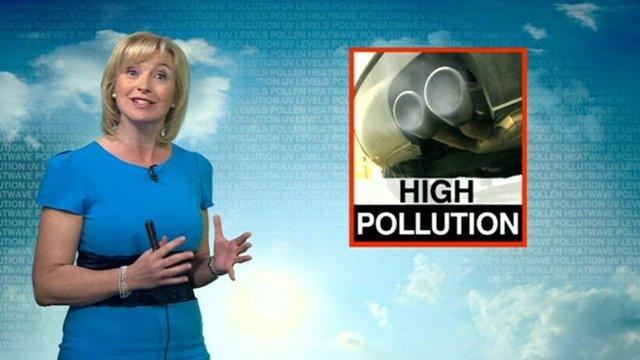UK air pollution: How bad is it?
- Published
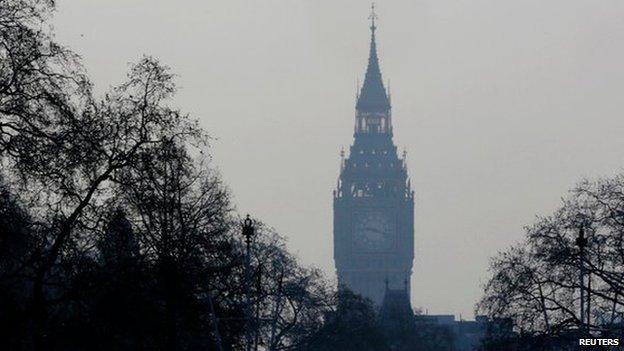
Health warnings have been issued for parts of England, as air pollution reaches high levels.
So what exactly is the problem, and how serious is it?
How bad is the pollution in the UK?
By UK standards, air pollution levels are high. The Department of the Environment measures outdoor air pollution on a one-to-10 scale. Parts of north-west Norfolk hit level 10 on Tuesday.
On Wednesday, levels were recorded at seven - meaning high - in towns and cities in East Anglia and rural parts of south-east England. Pollution levels of five were reached in London, the Midlands and Yorkshire and Humberside.

What has caused it?
The tipping point seems to have been dust from storms in the Sahara. Normally it settles in the countries of southern Europe - Spain, Malta and Greece, for example.
However, winds from the south and east have brought the dust to the UK, along with industrial pollution from Europe. And because those weather conditions are stable and not changing, those particles are not being dispersed.
But that is only part of the problem. Most air pollution in the UK comes from road transport and residential emissions.

Common transport in the Sahara, perhaps - not so frequently seen on UK roads

What is being measured?
Leaving aside the Sahara dust, the pollution is made up of various substances, including nitrogen dioxide, sulphur dioxide and ammonia.
These form particles in the atmosphere. The two most common measurements are particulate matter measuring 2.5 micrometres or less, known as PM2.5; and larger particles measuring 10 micrometres, known as PM10.
The World Health Organization (WHO) uses PM10 levels to measure pollution, expressed in micrograms per cubic metre. It recommends mean exposure over 24 hours to PM2.5 of no more than 10 micrograms/m3, and to PM10 of no more than 25.
PM2.5 particles are thought to be particularly damaging because they are so small, they can penetrate into the deepest parts of the lungs.
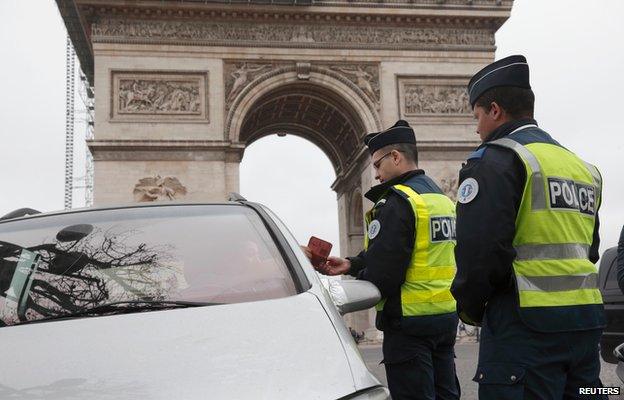
In Paris, cars with even-numbered plates were banned from driving for a day in March in a bid to cut pollution - and drivers flouting the order were stopped by police

Why is the UK doing so badly?
Last month, the EU announced it was taking legal action, external against the UK because it was persistently over the safe limit for air pollution - in particular, levels of nitrogen dioxide, external.
But the UK is not alone - most EU countries struggle to meet the targets, says Martin Adams of the European Environment Agency.
In fact, the EU is currently taking action against 17 out of 28 member states with serious air quality problems.
EU standards make allowances for natural sources of air pollution, including Saharan dust for Spain and ozone for coastal countries such as the UK.
Frank Kelly, professor of Environmental Health at King's College London, puts the blame for the UK's pollution woes squarely on the shift to diesel vehicles over the past 10 years.
Six out of 10 cars sold today in the UK are diesels, and these produce a lot of nitrogen dioxide, he says.
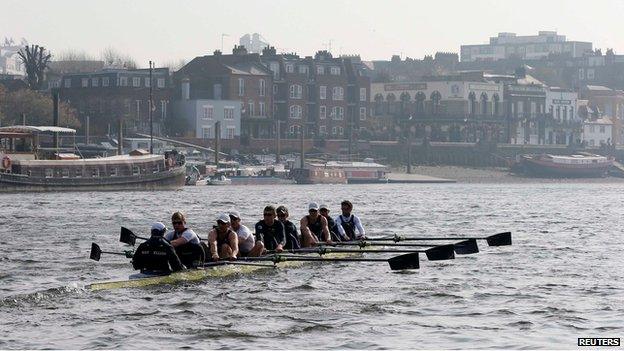
The Oxford rowing crew are sticking to their training schedule for this year's University Boat Race, despite the pollution

How serious a problem is air pollution generally?
In all, the WHO says air pollution is responsible for seven million premature deaths a year around the world.
That includes indoor as well as outdoor pollution - typically, smoke from cooking stoves in developing countries.
About 80% of deaths related to outdoor pollution are linked to heart disease and strokes, while 14% are due to lung or respiratory diseases, and 6% to cancer, estimates the WHO.
But even at times of lower pollution, UK air quality still routinely breaches WHO recommended limits. Even when the air looks clean, it is not.
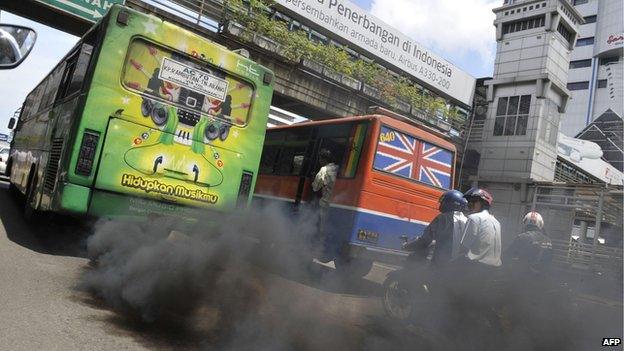
Buses belching black smoke, like these in the Indonesian capital, Jakarta, are an obvious source of pollution, but most particles are invisible

According to Joe Hennon, the European Commission's spokesman on pollution, around 30,000 people in the UK die prematurely every year from problems associated with air pollution.
He describes it as an "invisible killer".
"Air pollution can be carcinogenic," he said. "It also causes all kinds of respiratory problems, heart disease, [and] lung problems".
Some headlines have said the UK's air quality is worse than China - is that true?
No, says Professor Kelly.
When it comes to bad air quality, Beijing has few rivals. In February, at the height of a severe smog episode, the BBC's Jo Floto, in Beijing, wrote that the air quality in the city was "so bad it's comparable to living near a forest fire".
The Chinese government has recently begun publishing air quality figures for the major cities, although the accuracy of these is sometimes contested.
The US embassy in Beijing runs an air quality monitor and releases updates several times daily, external. At 21:00 (13:00 GMT) on Wednesday, it measured PM2.5 levels of 87, external - more than eight times the WHO 24-hour limit.
In February, levels soared to 15 times the WHO limit.
Compare that with the UK - in the hour to 16:00 on Wednesday, the highest PM2.5 level recorded by the Department for the Environment was 57, in Rochester, Kent.
UK air quality levels (Department for the Environment), external
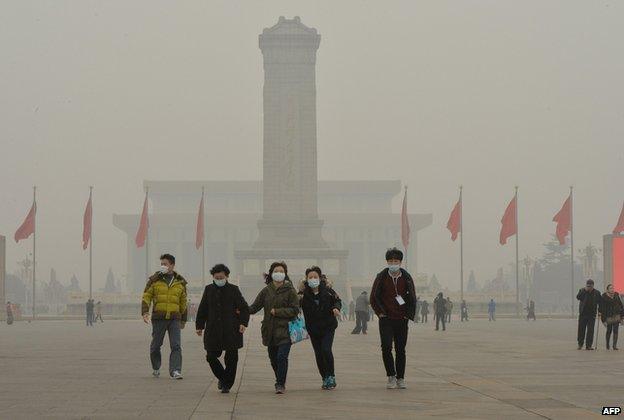
China has said the toxic smog over its cities is "nature's red light" and it will "declare war" on pollution

What might help cut the air pollution?
A change in the weather forecast for the end of the week is expected to bring some relief.
When pollution measures soared last month, Paris imposed restrictions, banning cars with even-numbered plates from driving on one day, followed by a ban on odd-numbered plates the following day.
The EU Environment Agency is awaiting data on whether the ban had much effect. In any case, London will not be following suit.
Mr Hennon says the UK can learn from cities like Amsterdam, where there are traffic restrictions - including speed restrictions on motorways - as well as good public transport links and cycle lanes.
But he warns there is no easy answer and a range of measures are needed to tackle the problem.
A shift towards less polluting forms of transport will be necessary, believes Prof Kelly. In 10 years' time, diesel vehicles will have been largely replaced by low-emission vehicles.
But he warns: "The political will needs to be substantial, because it will be costly."
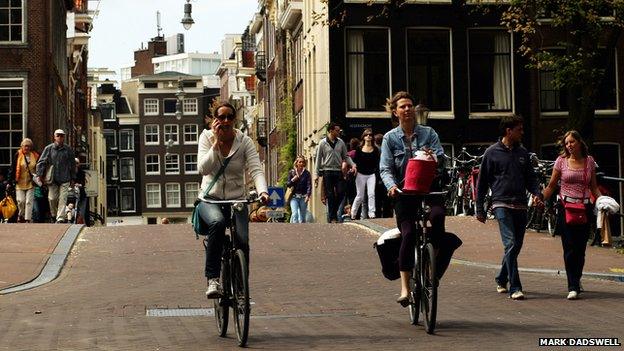
A switch to less polluting forms of transport would improve air quality
- Published2 April 2014

- Published2 April 2014
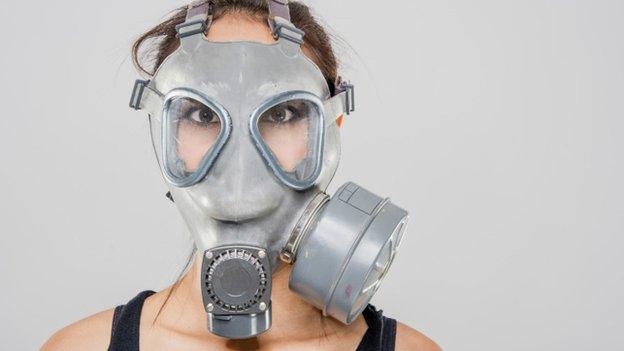
- Published2 April 2014
